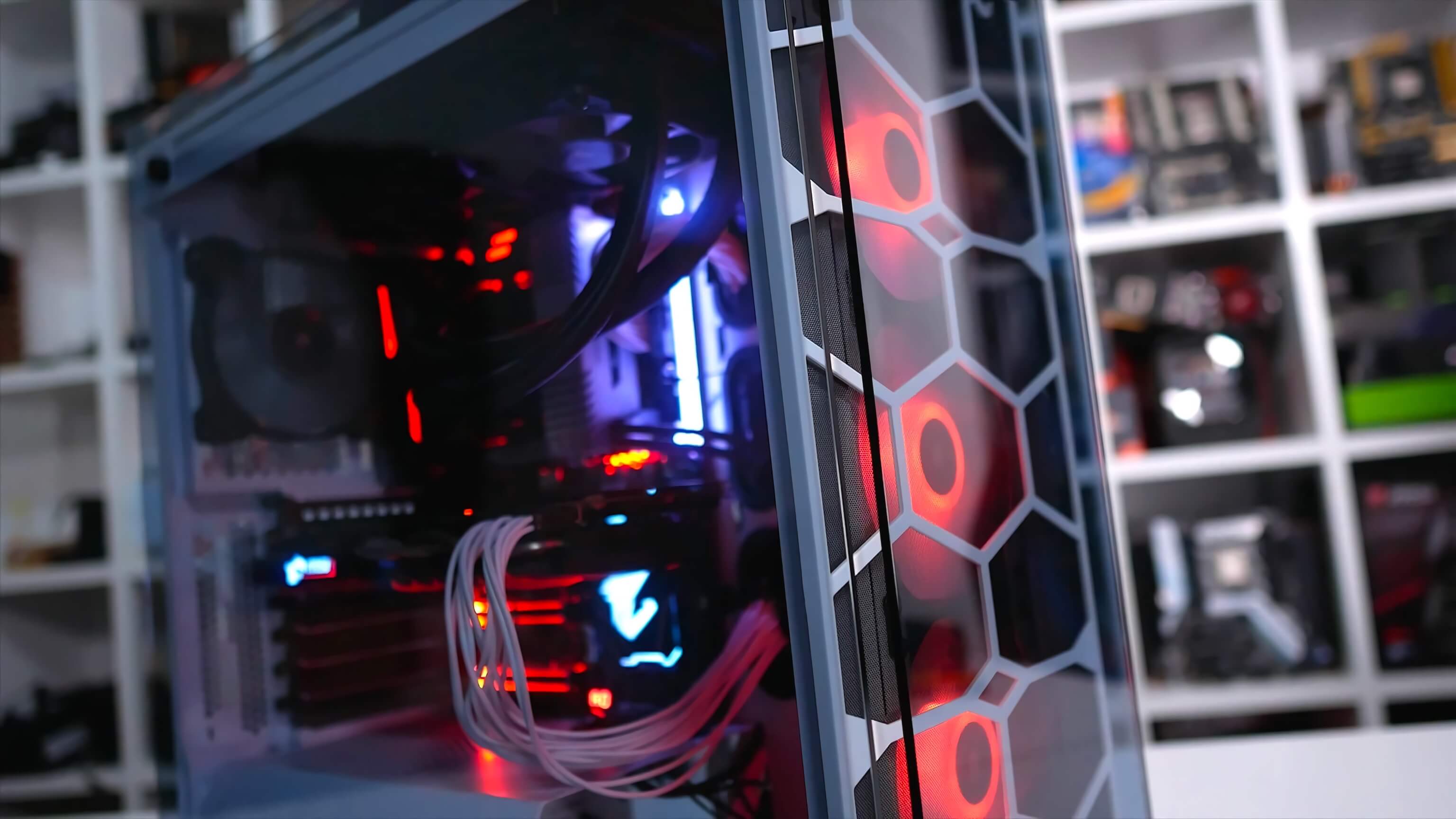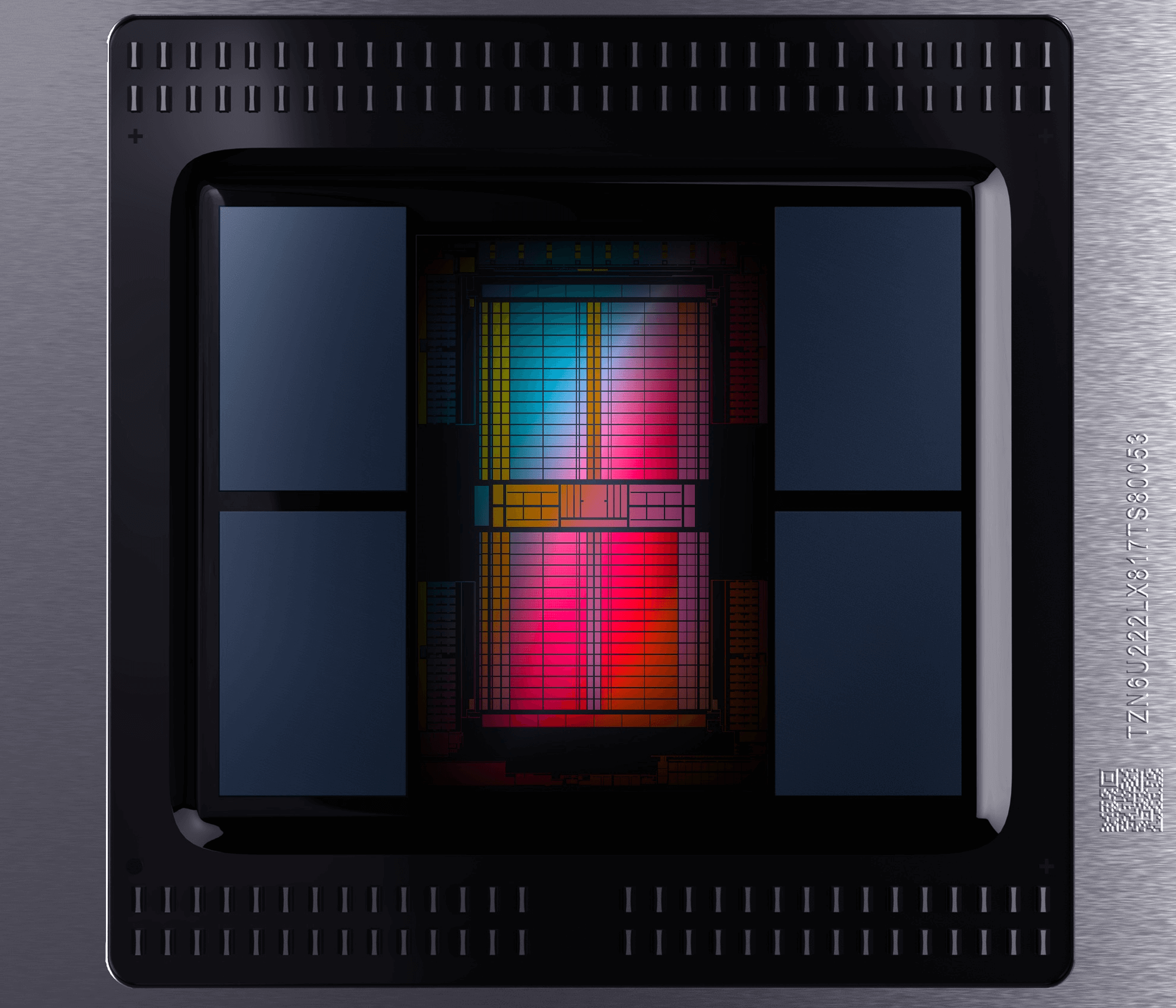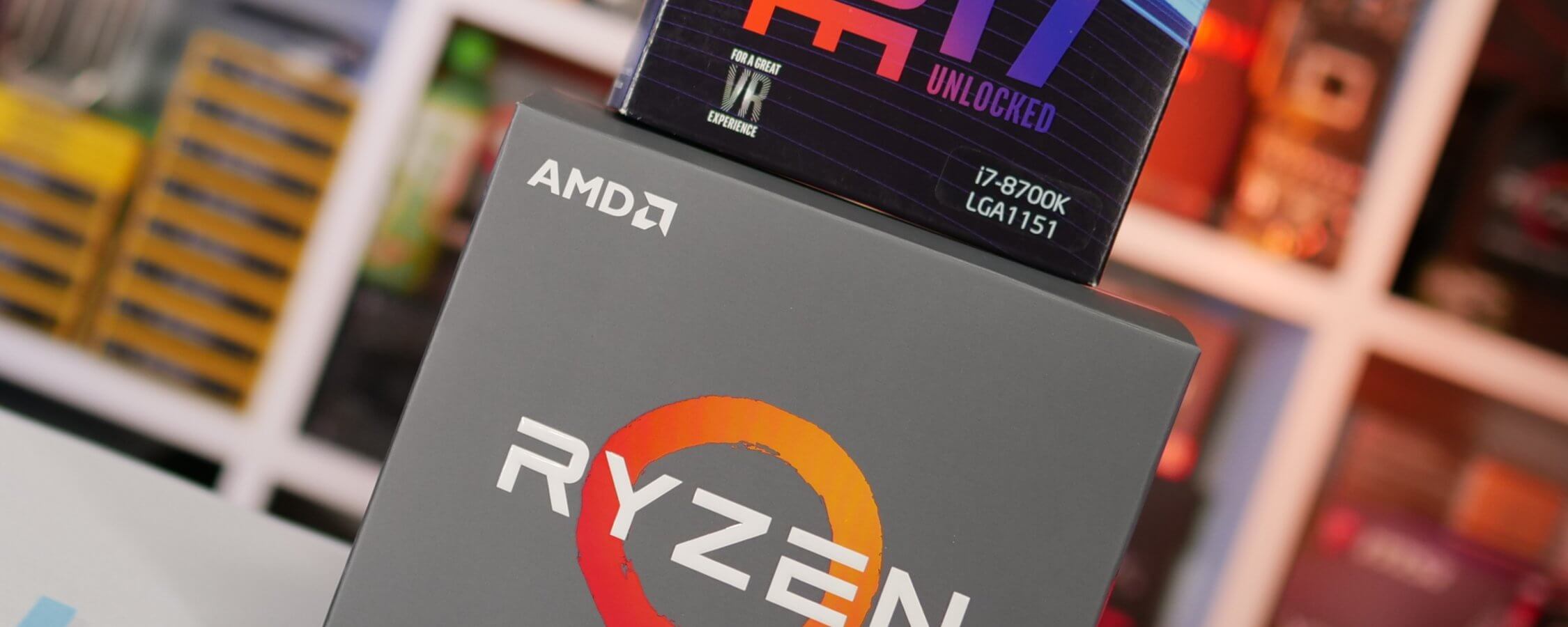Today we're looking at a few different hardware configurations to see if certain matchups work better than others. For example, when Ryzen first came onto the scene in 2017 it was discovered that Zen-based CPUs performed better when paired with a Radeon GPU, opposed to a GeForce GPU. The only problem was that the Radeon RX 480 was the fastest GPU AMD had to offer. Considering it was much slower than the competing GeForce GTX 1080 Ti, no one was using it for CPU testing.
Fast forward to today and the situation hasn't changed all that much. AMD's new flagship GPU, the Radeon VII is only able to match 2017's GTX 1080 Ti, making it much slower than the RTX 2080 Ti. Also, it's been largely unavailable since it launched a few weeks ago, though we have our review unit ready for testing.
We thought it could be interesting to test out some popular games using the Ryzen 7 2700X and Core i7-8700K processors, pairing each with the Radeon VII, GeForce GTX 1080 Ti and RTX 2080, as all three GPUs provide a similar level of performance.
Now, the focus of this test is not an AMD vs. Intel CPU comparison, we've done those many times in the past. It's not a straight GPU comparison either, we've also done plenty of those. The choice of CPU isn't even all that relevant. We could have used the 2600X and i5-8400, for example, since it's not a CPU comparison. Rather what we're most interested in here is monitoring performance margins, not outright performance.
Does one CPU perform better with a particular GPU, or are we simply gone mad about benchmarking? If only for fun's sake, here we go.
All testing was conducted at 1440p as we wanted to target more realistic gaming conditions. Since it's not a CPU test, benchmarking at 1080p or lower is not a priority. Both the Intel and AMD platforms were equipped with 16GB of DDR4-3200 CL14 memory and any performance enhancement features were disabled. All the benchmark data is fresh and was gathered specifically for this feature. For the GeForce GPUs driver version 419.17 was used and for the Radeon VII driver version 19.2.3.
Benchmarks
Starting with Assassin's Creed Odyssey we see that the three GPUs are evenly matched for the average frame rate when testing with the 8700K, the Radeon VII produces the best 1% low figure. Here it was 8% faster than the RTX 2080.

Moving over to the 2700X and the 1% low margin grows significantly, here the Radeon VII is 19% faster than the RTX 2080 and 11% faster than the GTX 1080 Ti. Interesting to see Turing providing the lowest frame rates in this test. The average frame rates are around 9% lower with the AMD CPU, the Radeon VII for example saw the average frame rate drop by 11% and the 1% low by 9%.
The RTX 2080 saw the average frame rate drop by 8% but the 1% low drop by 17%, so it's quite clear the Turing GPU isn't working as well with the Ryzen processor, at least in this title and we already know that Assassin's Creed Odyssey isn't a good game to showcase Ryzen with.
Moving to Apex Legends, we tested the same section of the multiplayer mode taking an average from three separate runs. This isn't a CPU demanding game, at least when high-end CPUs are involved. We see very similar results using either the 2700X or 8700K and the margins were also much the same, so all looks well here.

The performance seen in Battlefield V is pretty much what you'd expect to see. The RTX 2080 sees the biggest drop in 1% low performance when going from the 8700K to the 2700X, but this time that can be attributed to the Ryzen CPU creating a system bottleneck in this game. The same issue is seen when looking at the average frame rate of the Radeon VII.

Like Apex Legends, Forza Horizon 4 isn't a particularly CPU demanding game. In fact, we know this title will run happily on a modern dual-core such as the Athlon 200GE. Still we included it to check if there was any funny business going on, turns out there isn't, so let's move on.

When testing with Fortnite we see that both the GTX 1080 Ti and RTX 2080 provide better 1% low performance when paired with the Ryzen 7 2700X, quite significantly in the case of the Turing GPU. This is in stark contrast to the Radeon VII which was slightly slower for both the 1% low and average frame rate when paired with the AMD CPU. Overall though the results are similar, with the exception of the 1% low of the RTX 2080.
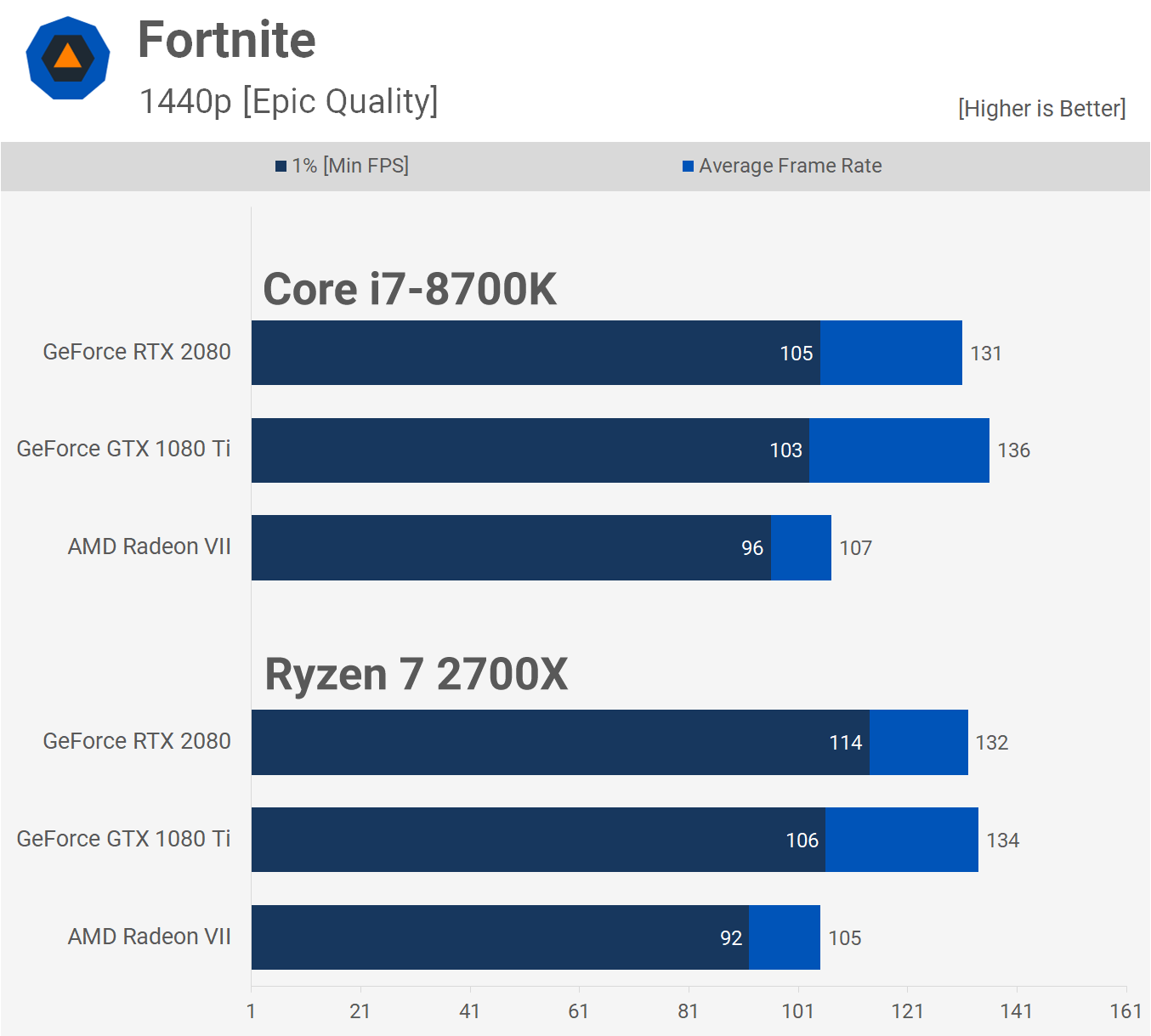
We discovered early on that Hitman 2 hates Ryzen processors. The original Hitman running with DX12 worked well, but for it went a bit backwards with the second installment. Overall the margins between the various GPUs remained the same, we're just down around 20% with the AMD processor.

Performance in Just Cause 4 looks pretty standard, the 2700X was slightly slower and this was seen with all three GPUs, so not much to report.

We see a similar story when testing with Metro Exodus. The higher clocked 8700K has a slight performance edge and this is true regardless of the GPU used. The margins are also the same with performance reductions around 3-5%.
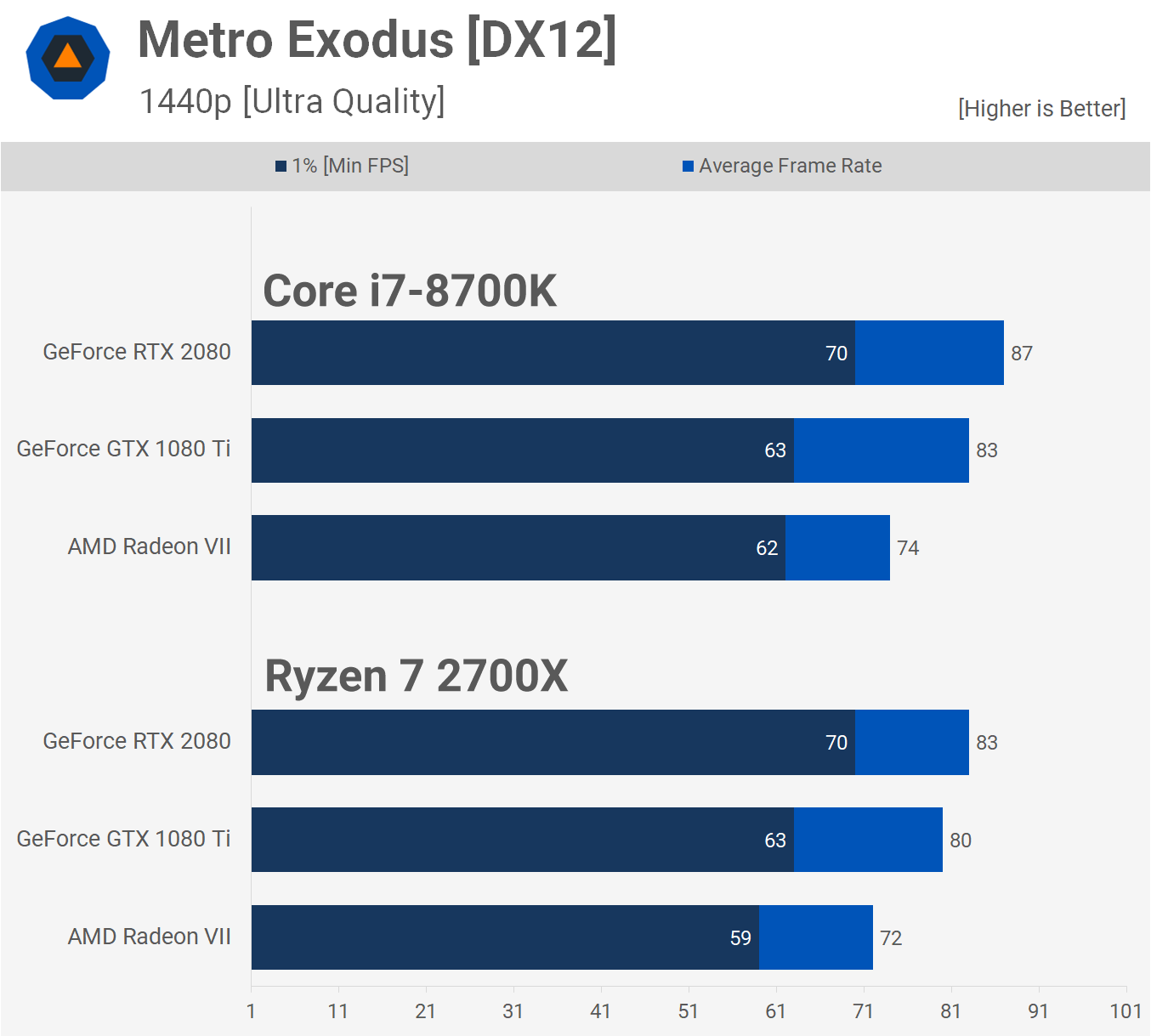
When testing with Project Cars 2 we observe that the GeForce GPUs have equivalent or slight better 1% low performance when paired with the Ryzen CPU, while the opposite is true of the Radeon VII. Granted the margins are small and we wouldn't read too much into it. So far nothing has come close to what we saw with Assassin's Creed.

Moving on to Resident Evil 2, when we ran our first batch of testing on the Ryzen 7 2700X there seemed to be an issue with the 1% low result, so we re-ran and got the same 60-ish fps. Moving to the next GPU and found the same, and in the end after an average of three runs for each configuration, these are the results.
For some reason the Ryzen CPU suffered periods where the 1% low would drop down to around 60 fps, meanwhile the 8700K maintained over 90 fps. This meant the 8700K was at least 54% faster for the 1% low but up to just 13% faster for the average frame rate.

Performance scaling in Rainbow Six Siege was consistent across all tested hardware configurations. Not much to report with both the 2700X and 8700K allowing the GPUs to deliver maximum performance, at least within a few frames of it in the case of the 2700X.

Surprisingly in the latest version of World of Tanks the Ryzen 7 2700X was a whisker faster than the 8700K and this was seen for all three configurations. The game has been upgraded recently to take advantage of multi-core processors and was designed with Ryzen in mind, so this is a very promising result for AMD users.

Bottom Line
Overall we're seeing pretty balanced performance in 2019. Nvidia appears to have improved driver compatibility with AMD processors and we're now seeing consistent strong frame rates on Ryzen-based CPUs, at least relative to an AMD GPU of similar capabilities.
As expected in titles that are not overly CPU intensive such as Apex Legends, Forza Horizon 4, Fortnite, Metro Exodus and Just Cause 4, to cite some examples, performance delta between the 2700X and 8700K was minor. Of course, we were testing at 1440p which tends to be a little more GPU bound, even with GTX 1080 Ti-class GPUs. But the purpose was clear, this was more of a system benchmark, opposed to a individual component test where we try to remove any bottlenecks that could limit performance of the hardware we're examining.
